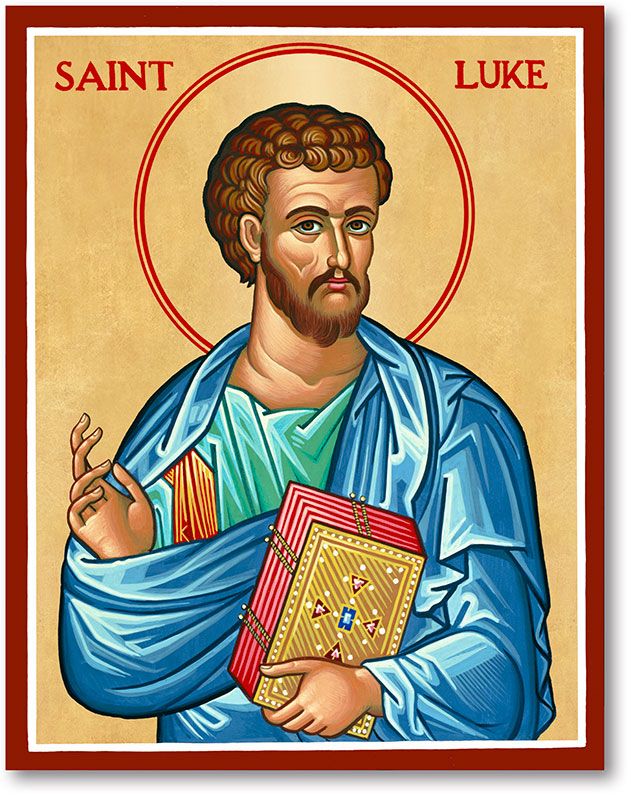Feast Day Epistles & Gospels
Feast of St. Luke the Evangelist
Some Wise Words from a Wise Man

“St Luke Icon” and “St Paul Icon” by Monastery Icons
Brethren, conduct yourselves wisely toward outsiders, making the most of the time. Let your speech always be gracious, seasoned with salt, so that you may know how you ought to answer every one.
Tychicos will tell you all about my affairs; he is a beloved brother and faithful minister and fellow servant in the Lord. I have sent him to you for this very purpose, that you may know how we are and that he may encourage your hearts, and with him Onesimos, the faithful and beloved brother, who is one of yourselves. They will tell you of everything that has taken place.
Aristarchos my fellow prisoner greets you, and Mark the cousin of Barnabas (concerning whom you have received instructions if he comes to you, receive him), and Jesus who is called Justos. These are the only men of the circumcision among my fellow workers for the kingdom of God, and they have been a comfort to me.
Luke the beloved physician and Demas greet you. Give my greetings to the brethren at Laodicea, and to Nympha and the church in her house. And when this letter has been read among you, have it read also in the church of the Laodiceans; and see that you read also the letter from Laodicea. And say to Archippos, “See that you fulfill the ministry which you have received in the Lord.”
I, Paul, write this greeting with my own hand. Remember my fetters. Grace be with you. Amen.
On October 18, we celebrate the Feast of St. Luke, an Apostle of the group known as “The Seventy,” and also one of the four Evangelists, or authors of the Four Gospels. We will discuss the Epistle lesson read on his feast day today and then discuss the Gospel passage tomorrow, as both of these readings merit discussion.
“Remember my fetters.”
It is obvious from the end of the Epistle lesson that Saint Paul wrote this letter to the church of Colossae while he was in prison, as he writes “Remember my fetters” (Colossians 4:18). Saint Paul wrote many of his Epistles from prison, where one would think that he would feel anxious and scared (about punishment and even potential death), angry (because of unjust imprisonment), or hurt (because of being tortured and not well cared for). And yet, Saint Paul always sounded cheerful in his writings. They never reflected sorrow at the gravity of his situation.
“Conduct yourselves wisely towards outsiders.”
The Epistle lesson begins with three solid pieces of advice. First, “Conduct yourselves wisely toward outsiders” (4:5). Many times we do not relate well to strangers. We might think a stranger is potential competition, so we might not be nice to such a person, seeing them as a potential threat or enemy. We might have certain prejudices against someone we don’t know, either because of how they look, where they come from, or something else we know about them, and therefore we do not give them a fair chance. We may see an outsider as a potential source of advancement or as an ally against someone else, and so we confide too much in them. We may be innately distrustful and choose to not confide in them at all. We may be occupied with our own friends and circumstances and not notice them at all.
Interacting with outsiders and strangers is a regular part of life. People will filter in and out of our lives, just as we will filter in and out of the lives of others. Thus, learning to deal with outsiders wisely is something we must all learn and something we can all probably do a lot better at.
“Make the most of the time.”
The second piece of advice is to “mak[e] the most of the time” (4:5). This refers specifically to the aforementioned outsiders, to make the time with them mutually beneficial, by setting aside prejudices, and offering a fair chance. In contemporary context, making the most of our time is a constant struggle. We are surrounded with distractions, namely our phones and electronic devices. We are attached to them, even addicted to them. Productivity is not helped by this attachment; in fact, it is often hindered. We all need to think of ways we can be more efficient in what we are doing, so that not only our work gets done, but so there is adequate time for family, personal time, exercise, and rest, four areas in which most of us can use some significant improvement. That is not to say that all electronics are bad and that we can’t use the phone for good things. It means being more intentional about how we spend our time, and looking critically at how much time we waste.
“Let your speech always be gracious…”
The third piece of advice concerns our speech: “Let your speech always be gracious, seasoned with salt, so that you may know how you ought to answer every one” (4:6). Salt adds flavor to food. It is a positive additive. Salt also is used as a preservative. “Seasoning” our speech with salt means that we should attempt to use speech that is positive and adds to relationship, as well as speech that is careful, especially in negative circumstances, so that we can preserve relationships and not sour them.
Some wise words from a wise man
If there are three things that get us into trouble these days, it is how we treat others, how we use our time, and the things that come out of our mouths. Saint Paul, in only two brief verses, has offered us some solid advice on all three.
Finally, verse 14 references “Luke the beloved physician,” which is why this passage is read on the feast of St. Luke on October 18.
Feast of St. Luke the Evangelist

From the Praises of Matins
You mastered the medicine of souls even better than of bodies; and inspired by God’s wisdom, you appeared adept at both.
Healing souls and bodies, O all-blest Apostle Luke, you call us all to spiritual knowledge, every day and lift us up to the heavens, to the love for God; and you pray Him for all those who honor you.
Translated by Fr. Seraphim Dedes
Be wise with people you don’t know. Make the most of your time. Be careful in your speech, so that it is both an additive to relationships, and that it is a preservative of relationships, rather than a destructive force in them.
+Fr. Stavros


0 Comments